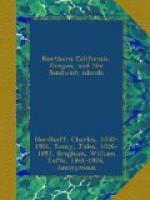This whole country is only about four years in advance of the lower or San Joaquin Valley, and the influence of climate and soil in bringing trees to bear early was shown to me in several thrifty orchards, already beginning to bear, on ground which four years ago was bought for two dollars and fifty cents per acre. The habit of raising wheat is so strong here, that almost every thing else is neglected; and I remember a farm where the wheat field extended, unbroken, except by a narrow path leading to the road, right up to the veranda of the farmer’s house. His family lived on canned fruits and vegetables; and except here and there a brilliant poppy, which stubborn Dame Nature had inserted among his wheat, wife and children had not a flower to grace mantle or table. I confess that it pleased me to hear this farmer complain of hard times, because, as he said, the speculators in San Francisco made more money from his wheat than he did. If the speculators in San Francisco teach the farmers in California to grow something besides wheat, they will deserve well of the State.
The upper waters of the Sacramento run through mountain passes, and between banks so steep that for miles at a time the river is inaccessible, except by difficult and often dangerous descents; and an old miner told me that when this part of the river, between where Redding now lies and its source, near Mount Shasta, was first “prospected” for gold, the miners or explorers had to build boats and descend by water, trying for gold by the way, because they could not get down by land. In those days, he said, if a company of miners could not make twenty dollars a day each, the “prospect” was too poor to detain them; and they made but a short stay at most points on the Upper Sacramento.
The country was then full of Indians; and it was very strange, indeed, to hear this miner—a thoroughly kind-hearted man he was, and now the father of a family of children—tell with the utmost unconcern, and as a matter of course, how they used to shoot down these Indians, who waylaid them at favoring spots on the river, and tried to pick them off with arrows.
I remember hearing a little boy ask a famous general once how many men he had killed in the course of his wars, and being disappointed when he heard that the general, so far as he know, had never killed any body. I suppose a soldier in battle but rarely knows that he has actually shot a man. But one of these old Indian fighters sits down after dinner, over a pipe, and relates to you, with quite horrifying coolness, every detail of the death which his rifle and his sure eye dealt to an Indian; and when this one, stroking meantime the head of a little boy who was standing at his knees, described to me how he lay on the grass and took aim at a tall chief who was, in the moonlight, trying to steal a boat from a party of gold-seekers, and how, at the crack of his rifle, the Indian fell his whole length in the boat and never stirred again, I confess I was dumb with amazement. The tragedy had not even the dignity of an event in this man’s life. He shot Indians as he ate his dinner, plainly as a mere matter of course. Nor was he a brute, but a kindly, honest, good fellow, not in the least blood-thirsty.




